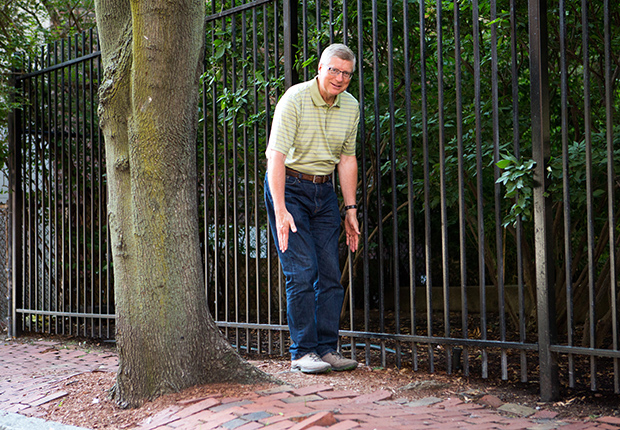AARP Hearing Center

By Jill Gambon
Roger Tepe says that something as mundane as tree pits—the structures in which trees are planted on city sidewalks—are treacherous for some people living in Boston. The pits, often covered by metal grates, can be a hazard for those using canes or wheelchairs, or for those who are unsteady on their feet.
“Tree pits are real barriers for some people,” said Tepe, 66, a retired human services director who lives in South Boston. But they can be addressed with simple solutions like leveling the dirt surrounding the tree, adding metal grates or landscaping with flowers to prevent people from stepping into them, he said.
Making sidewalks safer and easier to navigate is part of Boston’s Age-Friendly Action Plan, the city’s blueprint for making the Hub a more livable place, especially for older residents.
The plan covers such things as improving parks and roads; expanding access to public transportation; housing; health care services; and job opportunities for older residents. It identifies 75 action items that the city and its partners aim to accomplish over the next three years.
“There’s a lot of potential to improve things,” said Tepe, an AARP Massachusetts volunteer who served on the Age-Friendly Boston Action Planning Committee.
Boston joined the AARP Network of Age-Friendly Communities in 2014.
The network, affiliated with the World Health Organization, encourages communities to plan for their rapidly aging populations by focusing on topics such as housing, accessibility, social engagement and other factors that affect the well-being of individuals as they age. A growing number of communities from the Berkshires to Martha’s Vineyard has joined the network. Boston was the second to issue an action plan; Salem released its plan last November.
As part of the planning process, representatives of Mayor Martin J. Walsh’s administration, in partnership with the University of Massachusetts Boston and AARP, fanned out across the city and held more than two dozen listening sessions with neighborhood residents.
Feedback was also received from 3,700 survey respondents about what they need to stay in their homes and communities as they grow older.
Funding for the planning process was provided by the Tufts Health Plan Foundation.
Not just theoretical
“The action items reflect what people wanted. We’re placing an age-friendly lens on all city decisions,” said Emily Shea, Boston’s commissioner on affairs of the elderly.
“This is a serious effort by the city of Boston to take action. It’s not just a theoretical exercise. In some areas there will be immediate action; in others it will be longer term,” said Michael Festa, AARP Massachusetts state director.
Some of the immediate changes include making Senior CharlieCards—which allow people 65 and older to ride the MBTA at reduced rates—available for purchase in neighborhood senior centers, instead of in downtown Boston only, said Shea.
Work has also started on the redesign of city parks to make them more welcoming to older residents by adding amenities like walking tracks and benches.
What’s more, there are new programs aimed at supporting people with dementia and their caregivers. A big focus will be on getting the word out about all the programs and services available to older residents, like property tax breaks in exchange for volunteer work and low-cost home-repair services, Shea said.
AARP Massachusetts has a role to play in helping carry out several of the plan’s initiatives, including advocating for more affordable housing, working on fraud and elder abuse prevention and education, and helping to get more older residents engaged in civic activities, Festa said.
“This plan is going to transform what the city looks like for the next generation,” Festa predicted. “I think people will look back and say ‘Boston got it right.’ ”
For more information, contact the AARP Massachusetts office at 866-448-3621.
Jill Gambon is a writer living in West Newbury, Mass.































































